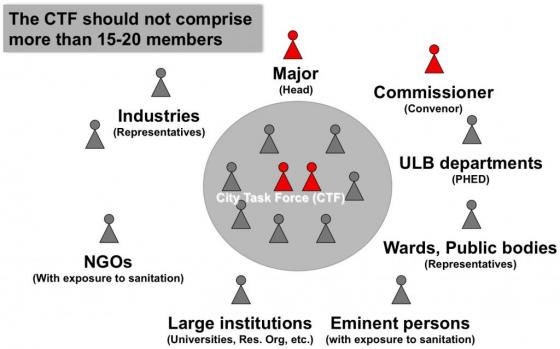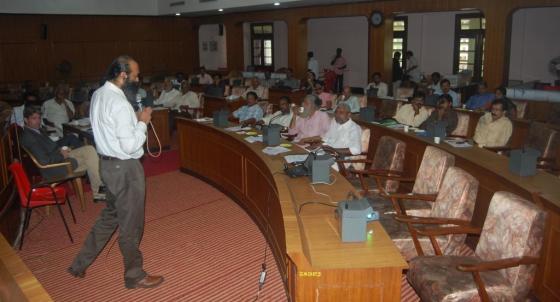المُلخص التنفيذي
| Disclaimer: Links within the texts to additional information, concepts and tools are SSWM editor’s inputs and might not represent the view or practices of GIZ. |
Identification of Members of the City Sanitation Task Force (CSTF)
According to the National Urban Sanitation Policy each city should constitute a multi-stakeholder platform comprising different representatives such as (adapted from MOUD 2008):
- Mayor of the Urban Local Body (ULB), who should head the CSTF.
- Municipal Commissioner, who will act as the Convenor.
- Representatives from divisions and departments of the ULBs directly responsible for sanitation including water supply (see also chapters purification and water distribution), on-site sanitation, sewerage, solid waste, drainage, etc.
- Representatives from the civil society, including association of neighbours of colonies, slum areas and apartment buildings, as well as owners of shops and establishments and educational and cultural institutions.
- Eminent persons, who enjoy outstanding credibility and influence. One of them can be appointed as the City Sanitation Ambassador.
- Representatives of other large institutions in the city (e.g. Cantonment Boards, Government of India or State Government Enterprise campuses, etc.).
- NGOs working on water and sanitation, urban development and slums, health and environment.
- Representatives of unions of safai karamcharis, sewerage sanitary workers, recycling agents, kabaris, etc.
- Representatives from private firms and contractors formally or informally working in the sanitation sector.
- Any other significant or interested stakeholders (see also stakeholder analysis).
The following diagram presents the members of the City Sanitation Task Force formed in Shimla, Varanasi, Nashik, Raipur, Kochi and Tirupati.

Members of the City Sanitation Task Force. Source: DUBE (2012)
GIZ in its efforts of launching the City Sanitation Plan Preparation in Shimla, Varanasi, Nashik, Raipur, Kochi and Tirupati supported the formation of the CSTF at the beginning of the process (see also case studies Raipur and Kochi). A GIZ environmental cell in each city was created within the Municipalities and consulting agencies were contracted to give technical support to the ULBs, i.e. the Consortium for DEWATS Dissemination Society (CDD) for Shimla, Varanasi and Raipur and ICRA Management Consulting Services Ltd. (IMaCS) for Nashik, Kochi and Tirupati. According to the methodology agreed, the consultants had to establish a first contact with the representatives of the city, building the needed trust to guide the ULB throughout the process. GIZ together with the group of experts supported the ULB during identification of relevant stakeholders to participate in the CSTF. This was carried out by the definition of the roles and responsibilities that each CSTF's member would have, the agenda and the profile of institution needed to activate the CSTF.
Formation and Dynamics of the City Sanitation Task Force (CSTF)
Serving as an opportunity for sharing knowledge and communicate expectations, GIZ organised a set of meetings with the consultants and environmental cells during the process of preparation of CSP. These workshops helped to communicate the guiding principles that should be kept in mind to come up with a CSP in line with the interests of the stakeholders and that also could present feasible solutions for the problems. One of the main important aspects clarified was the need to create ownership of the CSP within the ULB and the CSTF. It is the responsibility of the ULB (the Mayor, the Commissioner and the relevant stakeholders) to carry the CSP forward and the consultants should be seen only as a catalyst in this process. In this framework, the CSTF was and still is expected to play a crucial role in all stages of the project.

Second City Task Force meeting in Kochi, Kerala. Source: GIZ (2010)
A first CSTF meeting was then carried out in the selected cities with the aim of kicking-off the campaign “100% Sanitised city”. These meeting brought together the identified stakeholders to take a formal resolution to work together in line of the goal of the NUSP. Guided by the consultants, the groups developed their vision (see also visioning) of how would be the city in a given period of time, describing the aspirations of all different stakeholders. It was then recognised that participation and consultation would allow to direct the actions based on the real needs and what the stakeholder would expect from outcomes (see also decision making and stakeholder importance and influence).
The methodology to prepare the CSPs was also shared and discussed with the different CSTFs, identifying the role and their responsibilities of the task force.
The CSTF gathered in different meetings during the process of preparation of the CSP. They served as a monitoring and backstopping entity, providing information during the baseline data collection (see preparation of status report), revising and approving the status reports and the final CSP (see analysis of the information and planning) and defining operational frameworks for the implementation of the CSP.
Responsibilities of the City Sanitation Task Force (CSTF)
Adapted from MOUD (2008)
According to the NUSP, the City Sanitation Task Force will be responsible for:
- Launching the City 100% Sanitation Campaign to generate awareness amongst the city’s citizens (see also demand creation and awareness raising in the wastewater collection).
- Providing overall guidance to the implementation agencies, approving their materials and progress reports.
- Approving the City Sanitation Plan (see City Sanitation Plans according to the NUSP).
- Supervising the progress of the implementation of the CSP (see also project implementation).
- Issuing briefings to the media and state government about progress (see also follow up of projects).
- Recommending to the ULB fixing of responsibilities for city-wide sanitation on a permanent basis.
An Implementation Agency appointed by the CSTF
Adapted from MOUD (2008)
The Task Force should appoint one of the key agencies, preferably the ULB, to become the City Sanitation Implementing Agency for the CSP for the city. This agency will be responsible for day-to-day coordination, management and implementation of the sanitation programmes on a city-wide basis. The agency will coordinate with and agree on joint actions with other public agencies, and contract in and supervise the services of NGOs (through Memorandum of Understanding) and private parties (through contracts) for preparing and disseminating materials for information, education and communication (see also creating information material), conducting baseline surveys (e.g. baseline data collection) and stakeholder consultations (see also decision making), maintaining a comprehensive GIS-based database, implementing physical works, letting out and supervising O&M management contracts, etc.
The Sanitation Task Force will recommend the assigning of permanent responsibilities for city-wide sanitation to the ULB including the following aspects:
- The ULB to have final overall responsibility for city-wide sanitation, including devolving power, functions, functionaries and funds.
- Planning and financing.
- Asset creation including improvement and augmentation.
- Operation and maintenance (O&M) arrangements.
- Fixing water charges and revenue collection.
- Improving access and instituting special O&M arrangements for the urban poor and un-served populations in slum areas and in mixed areas.
- Adopting standards (e.g. invalid link) for: (a) Environmental Outcomes (e.g. State Pollution Control Board standards on effluent parameters); (b) Public Health Outcomes (e.g. State Health Departments); (c) Processes (e.g. safe disposal of on-site septage) (see also chapters wastewater collection and wastewater treatment; (d) Infrastructure (e.g. design standards) (PHEDs); and (e) Service Delivery standards (e.g. by Urban Development Departments)
- Adoption of regulatory roles including environmental standards (e.g. State Pollution Control Boards), health outcomes (e.g. Health Departments) (see also water pollution and invalid link).
- Training and Capacity Building of implementing agency and related personnel (see also train the trainers).
- Monitoring of 100% sanitation involving multiple stakeholders (see also stakeholder analysis).
City Sanitation Plans: Experiences and Perspectives of State and ULBs in India
This presentation gives an overview about GIZ and its collaboration with the Government of India to fulfil the Indian National Urban Sanitation Policy’s vision that all Indian cities and towns become totally sanitized: i.e. the participatory approach of the City Task Force, how to process city wide baseline information, the 5 pillars for good City Sanitation Plans, comparison of NUSP and RAY, among others.
DUBE, R. (2012): City Sanitation Plans: Experiences and Perspectives of State and ULBs in India. National Workshop on Improving Services in Urban Water Supply and Sanitation New Delhi, July 9-10, 2012. Eschborn: Deutsche Gesellschaft fuer Internationale Zusammenarbeit (GIZ)National Urban Sanitation Policy
This document describes the framework set by the Government of India to meet its overall goal of transforming urban India into community-driven, totally sanitised, healthy and liveable cities and towns.
MOUD (2008): National Urban Sanitation Policy. New Delhi: Ministry of Urban Development (MoUD). URL [Accessed: 18.06.2019]Report of the City Level Consultation Workshop for the Preparation of City Sanitation Plans for selected JNNURM and UIDSSMT Cities. 15th and 16th April 2010 at Woodrose Club, Bangalore
This report presents the discussions that took place in the first consultation workshop organised by GIZ, consultants and other stakeholders. References regarding the formation of the CSTF can be found in more detail.
GTZ (2010): Report of the City Level Consultation Workshop for the Preparation of City Sanitation Plans for selected JNNURM and UIDSSMT Cities. 15th and 16th April 2010 at Woodrose Club, Bangalore. Eschborn: Deutsche Gesellschaft für Technische Zusammenarbeit (GTZ)National Urban Sanitation Policy
This document describes the framework set by the Government of India to meet its overall goal of transforming urban India into community-driven, totally sanitised, healthy and liveable cities and towns.
MOUD (2008): National Urban Sanitation Policy. New Delhi: Ministry of Urban Development (MoUD). URL [Accessed: 18.06.2019]http://www.urbanindia.nic.in/CSP.htm
This is the web page of the Ministry of Urban Development of the Government of India. This section, completely devoted to preparation of CSP offers a set of presentations, in which different agencies show the methodology for the constitution of the CSTF.

